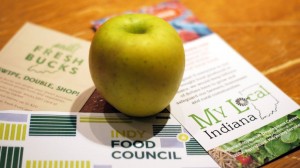By Nic Mink

Late at night, when I’m the last one left at the CUE office (heck, I’m the last one left in Gallahue Hall!), I crank music on Spotify. Loud, cheesy music. The type of music you sing along to by yourself, late at night, in the basement of an academic building, bathed in the blue hue of fluorescent bulbs and surrounded by piles of half-graded papers.
Tonight, the Five Stairsteps are in heavy rotation. They’re the group behind the funk-it-out, soul bending 1970 classic, “Ooh Child.” Its political message is now largely lost, but its lyrics still resonate with people who recognize the tremendous opportunities that the future holds.
“Ooh child, things are gonna get easier. Ooh child, things’ll get brighter”
For food and food system change, the future is bright indeed! Citizens, entrepreneurs, policy makers, farmers, chefs—all of those people who make up the “food system”—are collaborating like never before to bring healthier food into communities and to create more just and equitable food systems. In the process, food is quickly becoming a catalyst for meaningful and lasting transformation in American society.
Look around and you’ll notice the way that people grow food and eat food is transforming, quite radically, right before our eyes. Eating locally and organically are no longer just buzzwords, but are now commonplace activities for many Americans. The number of community gardens and farms in urban areas are exploding. National policy makers are reinforcing this change through large-scale public investments. In the most recent Farm Bill, for instance, seed money for farmers’ market and local food promotion quintupled.
Locally, citizens in Indianapolis just launched the Indy Food Council, an organization that looks to build community around food and advance food system ideas and initiatives at a city-wide level. The City-County Council recently passed a Healthy Food Resolution that commits the city’s resources to building a better food system. Organizations like Growing Places Indy, Fall Creek Gardens, Indy Urban Acres, and Distelrath Farm—to name just a few—are growing both food and community here in Indianapolis.
These developments represent a groundswell and a seismic shift, but brighter, still, we must become.
Nicolaas Mink, PhD is the urban sustainable foods fellow at the Center for Urban Ecology.
